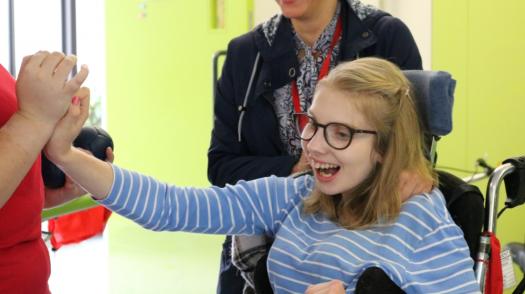
Residential rehabilitation
We offer a range of residential brain injury rehabilitation services for children and young people with acquired brain injury (ABI).
In April 2021 Spike had a serious skateboarding accident, falling headfirst into a wall. Mum Carrie shares their story.
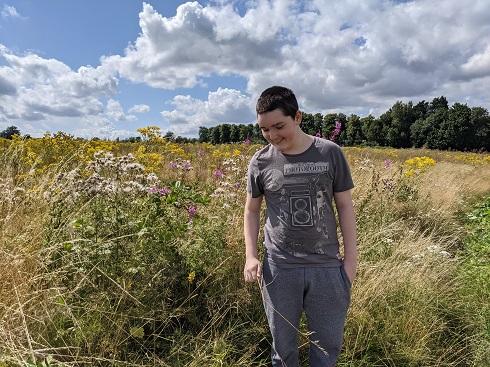
Published: January 2022. Date of brain injury: April 2021 (aged 14 years old)
I'm not sure where it started and where it ended. I remember hearing the air ambulance and the sirens, feeling my stomach sink, and the last text I’d had from Spike asking what time he had to be home.
I remember seeing my phone flash with a call from Spike and feeling relieved to see his name come up. I answered it and it was a police officer.
I remember getting my bag and shutting the front door on a half-cooked Sunday dinner and a half-wallpapered bedroom. I got into an unmarked police car and they said we had to get to The Royal London hospital now. I remember looking at the speedometer, the blue lights, and that my phone kept ringing and I wished it would stop.
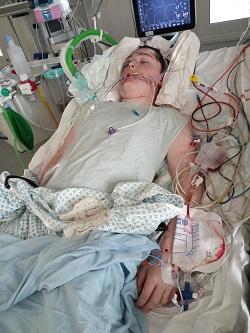
My memory stops there until I had to sign the consent forms for the brain surgery – a full right side craniectomy to save Spike’s life.
Arriving at The Royal London Hospital
When Spike arrived at the hospital he was intubated and ventilated, with a slim chance of survival. Spike was placed in an induced coma and taken straight into theatre.
He had a broken skull, cheekbone and eye socket. They had to remove part of the bone from the skull to expose the brain and release the swelling. The injury had also damaged the nerve in Spike’s eye. Spike had a team of neurosurgeons working on him and a specialist maxillofacial team.
On our second day in hospital Spike was taken off the sedation. He still had a small amount, but he started to move when he was pinched, which was a good sign.
His prognosis wasn’t clear as the damage to the right side of his brain was significant, and the CT scan showed he also had possible damage to the gland in the base of his brain, which controls hormones and growth.
However, the consultants were quietly confident as Spike passed the critical 72-hour stage. Progress was slow but positive.
The first week in hospital
After five days in hospital Spike woke up. He was breathing unaided, and we even got a thumbs up. He was confused but talking – and asked for David Bowie music!
It was an amazing day; my boy was alive! We could leave critical care behind us and start recovery and rehabilitation.
Spike continued to make good progress when we moved from the Paediatric Intensive Care Unit (PICU) to the Children’s Ward. His speech became clearer and the doctors were amazed at how far he’d come in such a short time. They slowly turned machines off as Spike needed medication less and less. We could sit quietly with Spike breathing on his own listening to the radio. It almost started to feel calm again.
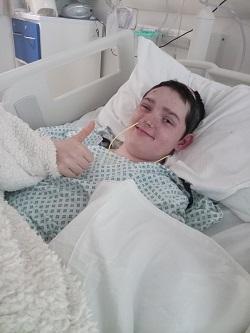
Spike continued to improve, but we noticed he’d be lovely one minute then angry, upset, shouting and swearing the next. An MRI scan confirmed that his brain was damaged on the right frontal lobe – the part that controls emotions and inhibitions.
This explained the change in Spike’s behaviour, but it made the whole process even more difficult. I'd spent 14 years looking after my Spike through childhood illnesses, colds and bugs. In hospital I could only sit there, hold his hand and chat to him. It was the most difficult thing I’ve ever had to do.
After about two weeks I went home for the first time to have a bath, get a good night’s sleep, and grab some clean clothes. I was incredibly anxious to leave him, but the nurses were amazing and I knew Spike was safe.
A second surgery
Sixteen days after Spike’s accident, he underwent a second surgery to repair the many fractures – a full facial reconstruction. The bone flap in his skull was also replaced from ear to ear. Thankfully it all went well.
Spike was swollen for a few days, but he was quickly able to swallow and drink by himself.
He remembered things that had happened on the ward before the surgery, including the names of some of the nursing staff. This was really positive – especially as everyone was wearing masks, making it more difficult than usual.
Visitors and a wheelchair for Spike
In May, a month after the accident, Spike reached several huge milestones. He chewed and swallowed food – only small bites at first, but it was amazing progress.
The injections that made Spike angry and upset were stopped, and his medicine was adjusted to propranolol rather than a mixture of painkillers, which helped with his constant headaches.
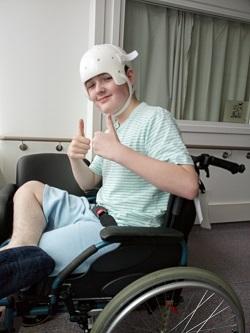
Spike also got a new set of wheels and could travel out of his room, which was lovely. He had to wear his helmet all the time, apart from in bed, because he had no bone flap in his skull but Spike was very grateful for the freedom – albeit limited.
Probably the best news of all was that his siblings Megan and Fin could visit him. Due to COVID regulations, only I had been allowed in the ward but that changed toward the end of the month. Spike was so excited to have different visitors.
In June, we started to talk about a potential discharge date. Spike was doing remarkably well – walking, talking and eating. His memory still wasn’t good in the short-term, and he had trouble staying on task, but this could improve with time.
Our lives had changed massively but it was no longer an unmanageable situation.
The third and final surgery
On 19 June, Spike went back down to theatre for his cranioplasty. Everything was going well until they found a small infection on one of Spike’s cracked sinuses. Spike then needed a PICC line (peripherally inserted central catheter line) to receive IV antibiotics for the next few weeks.
Spike was in theatre for 10.5 hours. For the first five hours I remained calm, for the next five I didn't cope so well. But I was hopeful it would be Spike’s last surgery.
It took Spike a long time to come round but he eventually woke up. His discharge for a weekend back home was postponed because of the IV antibiotics, but it felt like I’d be able to take my boy home in the not-so-distant future. It was finally within reach.
Discharge from hospital
Having spent just over 13 weeks in one of the biggest trauma hospitals in London, July saw Spike’s discharge day. It was truly amazing to see his progress from when he was first admitted.
It was lovely to have Spike home, but after a couple of weeks I started to miss the routine I’d had, getting on the train and visiting him in hospital. We seemed to drift from day-to-day with no real need to do anything.
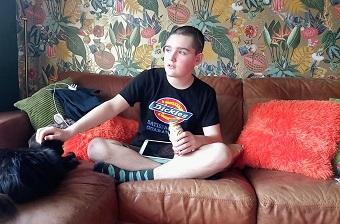
Spike really struggled with his short-term memory. Sometimes he couldn’t remember what he was doing once he started something, or that he’d eaten just half an hour ago. He didn't have the concentration for his computer or gaming either.
Spike was in his own little world most of the time, giggling at inappropriate things and shouting out loud at different times of the day. Then we’d get a few moments of our normal 14-year-old Spike.
I often wondered what was happening in his head. Sometimes it was hard to get an idea on how to help him.
In August we had the best possible news that Spike could start his rehabilitation placement at The Children’s Trust in Surrey. That meant that he could continue with his rehabilitation before going back to school in October.
Things finally felt like they were returning to something a bit more normal, and the future started to look so much brighter.
Residential rehabilitation
At the end of August we arrived in Tadworth to start Spike’s six weeks of intensive rehabilitation. Almost immediately I could see how beneficial the stay was going to be. Just three days in, Spike was riding a bike outside in the sunshine, ticking off one of his rehab goals.
It was lovely to see Spike interact with the staff and other young people and their families. The atmosphere was very calm, and it was good to see Spike in a different environment.
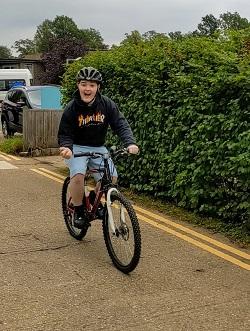
Going home had been tough. I'd felt overwhelmed and somewhat out of control – ‘professional winging it’ as a parent and carer. I wish there’d been more help in the community but we’d managed, and Spike now had access to wonderful facilities.
Initially I stayed in the parent accommodation. It was very homely, and I was able to cook my own tea and take some time to myself knowing that Spike was happy and so well looked after. It was a bit like being on holiday – and the ability to share the responsibility was very welcome.
As well as his physical recovery, Spike made huge improvements in his cognitive recovery.
During the first couple of weeks, he needed constant supervision due to his impaired judgement and limited safety awareness, but by the midpoint he was doing lots more on his own with different members of the therapy teams.
It was lovely to see Spike start to regain his independence away from my constant shadowing.
Spike still has a slight weakness on his left side, but this should never hold him back from anything in his future.
On 7 October Spike rang the going home bell to signify the end of his rehabilitation at The Children’s Trust and celebrate how much progress he’d made in just six weeks.
It had been 179 days since his accident, and we were both ready to go home properly and ease ourselves into a new routine.
Birthday celebrations and looking to the future
We celebrated Spike’s 15th birthday in November and it felt like the start of a new chapter, putting a somewhat traumatic year behind us.
Spike's doing really well, progressing all the time. He attends school every morning – the fatigue gets to him occasionally, but he enjoys being back and mixing with his friends.
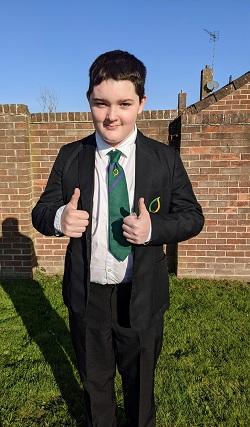
Spike has started to be a little more independent and I've started to relax a little more. We've fallen into a routine and things are starting to feel slightly normal again.
I'm so grateful for everything that has been done for Spike. If I counted up the individuals involved we’d probably have a team of about 200 people that helped put Spike back together.
Thank you to the Air Ambulance and Hertfordshire Police. Thank you to everyone at The Royal London Hospital who supported us: the surgeons, the PICU team, the specialist nurses, the therapy teams, the health care assistants, and Margaret at the Child Brain Injury Trust.
And finally thank you to everyone at The Children's Trust – what an amazing job you all do!
We’ll always be so appreciative of the care and support Spike has received during the past year. It's certainly been a journey, especially with the COVID restrictions that dictated several things during Spike’s recovery, but Spike’s now back at home with a bright future ahead.

We offer a range of residential brain injury rehabilitation services for children and young people with acquired brain injury (ABI).
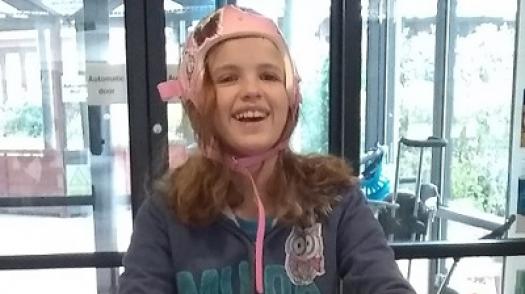
Mia sustained a serious brain injury during a quad biking accident. Mum Angela shares their story.
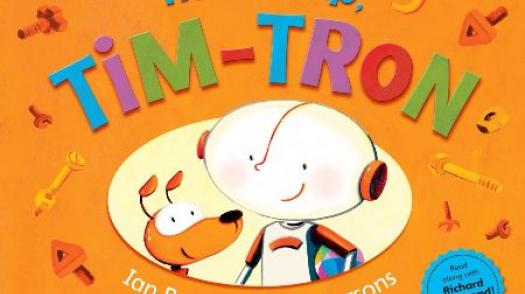
Our series of free books and resources aimed at children and families (P&P costs only).